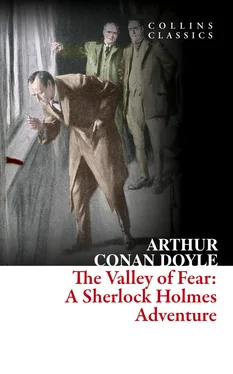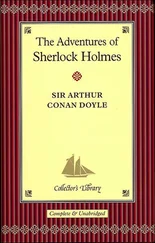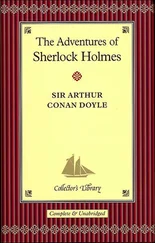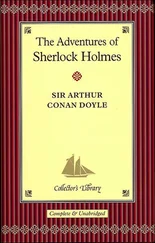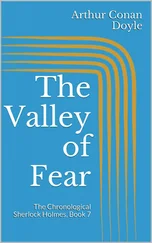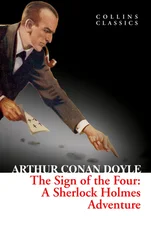“Frequently, sir.”
“You never heard any speculation as to what it meant?”
“No, sir.”
“It must have caused great pain when it was inflicted. It is undoubtedly a burn. Now, I observe, Ames, that there is a small piece of plaster at the angle of Mr. Douglas’s jaw. Did you observe that in life?”
“Yes, sir, he cut himself in shaving yesterday morning.”
“Did you ever know him to cut himself in shaving before?”
“Not for a very long time, sir.”
“Suggestive!” said Holmes. “It may, of course, be a mere coincidence, or it may point to some nervousness which would indicate that he had reason to apprehend danger. Had you noticed anything unusual in his conduct, yesterday, Ames?”
“It struck me that he was a little restless and excited, sir.”
“Ha! The attack may not have been entirely unexpected. We do seem to make a little progress, do we not? Perhaps you would rather do the questioning, Mr. Mac?”
“No, Mr. Holmes, it’s in better hands than mine.”
“Well, then, we will pass to this card—V.V. 341. It is rough cardboard. Have you any of the sort in the house?”
“I don’t think so.”
Holmes walked across to the desk and dabbed a little ink from each bottle on to the blotting paper. “It was not printed in this room,” he said; “this is black ink and the other purplish. It was done by a thick pen, and these are fine. No, it was done elsewhere, I should say. Can you make anything of the inscription, Ames?”
“No, sir, nothing.”
“What do you think, Mr. Mac?”
“It gives me the impression of a secret society of some sort; the same with his badge upon the forearm.”
“That’s my idea, too,” said White Mason.
“Well, we can adopt it as a working hypothesis and then see how far our difficulties disappear. An agent from such a society makes his way into the house, waits for Mr. Douglas, blows his head nearly off with this weapon, and escapes by wading the moat, after leaving a card beside the dead man, which will, when mentioned in the papers, tell other members of the society that vengeance has been done. That all hangs together. But why this gun, of all weapons?”
“Exactly.”
“And why the missing ring?”
“Quite so.”
“And why no arrest? It’s past two now. I take it for granted that since dawn every constable within forty miles has been looking out for a wet stranger?”
“That is so, Mr. Holmes.”
“Well, unless he has a burrow close by or a change of clothes ready, they can hardly miss him. And yet they HAVE missed him up to now!” Holmes had gone to the window and was examining with his lens the blood mark on the sill. “It is clearly the tread of a shoe. It is remarkably broad; a splay-foot, one would say. Curious, because, so far as one can trace any footmark in this mud-stained corner, one would say it was a more shapely sole. However, they are certainly very indistinct. What’s this under the side table?”
“Mr. Douglas’s dumb-bells,” said Ames.
“Dumb-bell—there’s only one. Where’s the other?”
“I don’t know, Mr. Holmes. There may have been only one. I have not noticed them for months.”
“One dumb-bell—” Holmes said seriously; but his remarks were interrupted by a sharp knock at the door.
A tall, sunburned, capable-looking, clean-shaved man looked in at us. I had no difficulty in guessing that it was the Cecil Barker of whom I had heard. His masterful eyes travelled quickly with a questioning glance from face to face.
“Sorry to interrupt your consultation,” said he, “but you should hear the latest news.”
“An arrest?”
“No such luck. But they’ve found his bicycle. The fellow left his bicycle behind him. Come and have a look. It is within a hundred yards of the hall door.”
We found three or four grooms and idlers standing in the drive inspecting a bicycle which had been drawn out from a clump of evergreens in which it had been concealed. It was a well used Rudge-Whitworth, splashed as from a considerable journey. There was a saddlebag with spanner and oilcan, but no clue as to the owner.
“It would be a grand help to the police,” said the inspector, “if these things were numbered and registered. But we must be thankful for what we’ve got. If we can’t find where he went to, at least we are likely to get where he came from. But what in the name of all that is wonderful made the fellow leave it behind? And how in the world has he got away without it? We don’t seem to get a gleam of light in the case, Mr. Holmes.”
“Don’t we?” my friend answered thoughtfully. “I wonder!”
CHAPTER 5
The People of the Drama
“Have you seen all you want of the study?” asked White Mason as we reentered the house.
“For the time,” said the inspector, and Holmes nodded.
“Then perhaps you would now like to hear the evidence of some of the people in the house. We could use the dining room, Ames. Please come yourself first and tell us what you know.”
The butler’s account was a simple and a clear one, and he gave a convincing impression of sincerity. He had been engaged five years before, when Douglas first came to Birlstone. He understood that Mr. Douglas was a rich gentleman who had made his money in America. He had been a kind and considerate employer—not quite what Ames was used to, perhaps; but one can’t have everything. He never saw any signs of apprehension in Mr. Douglas: on the contrary, he was the most fearless man he had ever known. He ordered the drawbridge to be pulled up every night because it was the ancient custom of the old house, and he liked to keep the old ways up.
Mr. Douglas seldom went to London or left the village; but on the day before the crime he had been shopping at Tunbridge Wells. He (Ames) had observed some restlessness and excitement on the part of Mr. Douglas that day; for he had seemed impatient and irritable, which was unusual with him. He had not gone to bed that night; but was in the pantry at the back of the house, putting away the silver, when he heard the bell ring violently. He heard no shot; but it was hardly possible he would, as the pantry and kitchens were at the very back of the house and there were several closed doors and a long passage between. The housekeeper had come out of her room, attracted by the violent ringing of the bell. They had gone to the front of the house together.
As they reached the bottom of the stairs he had seen Mrs. Douglas coming down it. No, she was not hurrying; it did not seem to him that she was particularly agitated. Just as she reached the bottom of the stair Mr. Barker had rushed out of the study. He had stopped Mrs. Douglas and begged her to go back.
“For God’s sake, go back to your room!” he cried. “Poor Jack is dead! You can do nothing. For God’s sake, go back!”
After some persuasion upon the stairs Mrs. Douglas had gone back. She did not scream. She made no outcry whatever. Mrs. Allen, the housekeeper, had taken her upstairs and stayed with her in the bedroom. Ames and Mr. Barker had then returned to the study, where they had found everything exactly as the police had seen it. The candle was not lit at that time; but the lamp was burning. They had looked out of the window; but the night was very dark and nothing could be seen or heard. They had then rushed out into the hall, where Ames had turned the windlass which lowered the drawbridge. Mr. Barker had then hurried off to get the police.
Such, in its essentials, was the evidence of the butler.
The account of Mrs. Allen, the housekeeper, was, so far as it went, a corroboration of that of her fellow servant. The housekeeper’s room was rather nearer to the front of the house than the pantry in which Ames had been working. She was preparing to go to bed when the loud ringing of the bell had attracted her attention. She was a little hard of hearing. Perhaps that was why she had not heard the shot; but in any case the study was a long way off. She remembered hearing some sound which she imagined to be the slamming of a door. That was a good deal earlier—half an hour at least before the ringing of the bell. When Mr. Ames ran to the front she went with him. She saw Mr. Barker, very pale and excited, come out of the study. He intercepted Mrs. Douglas, who was coming down the stairs. He entreated her to go back, and she answered him, but what she said could not be heard.
Читать дальше
